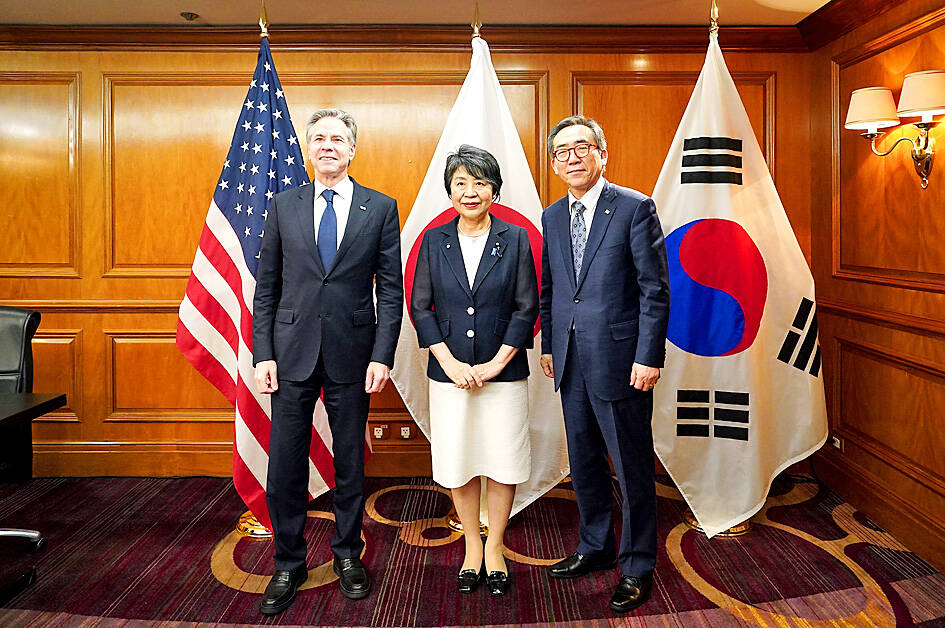The Ministry of Foreign Affairs yesterday expressed gratitude to the US, Japan and South Korea for their continuous attention to issues across the Taiwan Strait, and their efforts to maintain cross-strait peace and stability.
US Secretary of State Antony Blinken, Japanese Minister of Foreign Affairs Yoko Kamikawa and South Korean Minister of Foreign Affairs Cho Tae-yul “discussed efforts to maintain peace and stability across the Taiwan Strait” on the sidelines of the G20 Foreign Ministers Meeting in Rio de Janeiro, Brazil, on Thursday, US Department of State spokesman Mathew Miller said.
The three leaders also exchanged views on “ongoing and future efforts to support one another’s respective Indo-Pacific strategies,” as well as North Korea’s provocative behaviors and the conflict in Gaza during the trilateral meeting, Miller said.

Photo: EPA-EFE / South Korean Ministry of Foreign Affairs
In Taipei, the ministry welcomed the discussion by the three heads of foreign affairs based on the collective stance their leaders adopted at a historic summit at Camp David, Maryland, in August last year.
US President Joe Biden, Japanese Prime Minister Fumio Kishida and South Korean President Yoon Suk-yeol in a post-summit statement reaffirmed “the importance of peace and stability across the Taiwan Strait as an indispensable element of security and prosperity in the international community,” and called for a peaceful resolution of cross-strait issues.
China’s provocative actions intended to undermine the “status quo” across the Taiwan Strait, such as its military intimidation against Taiwan and a unilateral change to flight route M503, have posed severe challenges to regional security and aroused great concern from the international community, the ministry said.
Like-minded nations have reiterated the importance of cross-strait peace and stability during leaders’ summits and multilateral meetings, showing that a strong consensus exists on the issue, it said.
As a responsible member of the international community, Taiwan is to continue working with international partners to safeguard the rules-based international order, and promote regional peace, stability and prosperity, it added.
Separately, President Tsai Ing-wen (蔡英文) yesterday thanked the Japanese government for underlining the importance of cross-strait peace and stability.
Tsai made the remarks during her meeting with Sasakawa Peace Foundation executive director Nobukatsu Kanehara at the Presidential Office in Taipei.
Tsai thanked Kanehara, a senior diplomat, for his support and concern about relations between Taiwan and Japan, and for providing insights on Taiwanese and Japanese affairs in books and at forums.
She also expressed gratitude to the Japanese government for reaffirming the importance of peace and stability across the Taiwan Strait on many occasions.
Taiwan and Japan have always been good friends that support each other, such as overcoming the challenges of the COVID-19 pandemic, and signing agreements to facilitate economic, industrial and cultural exchanges, she said.
Tsai said she hoped to see the two sides continue to expand their cooperation in various fields, and to jointly safeguard democracy and freedom to create a free and open Indo-Pacific region.

Conflict with Taiwan could leave China with “massive economic disruption, catastrophic military losses, significant social unrest, and devastating sanctions,” a US think tank said in a report released on Monday. The German Marshall Fund released a report titled If China Attacks Taiwan: The Consequences for China of “Minor Conflict” and “Major War” Scenarios. The report details the “massive” economic, military, social and international costs to China in the event of a minor conflict or major war with Taiwan, estimating that the Chinese People’s Liberation Army (PLA) could sustain losses of more than half of its active-duty ground forces, including 100,000 troops. Understanding Chinese

The Ministry of Foreign Affairs (MOFA) yesterday said it is closely monitoring developments in Venezuela, and would continue to cooperate with democratic allies and work together for regional and global security, stability, and prosperity. The remarks came after the US on Saturday launched a series of airstrikes in Venezuela and kidnapped Venezuelan President Nicolas Maduro, who was later flown to New York along with his wife. The pair face US charges related to drug trafficking and alleged cooperation with gangs designated as terrorist organizations. Maduro has denied the allegations. The ministry said that it is closely monitoring the political and economic situation

‘SLICING METHOD’: In the event of a blockade, the China Coast Guard would intercept Taiwanese ships while its navy would seek to deter foreign intervention China’s military drills around Taiwan this week signaled potential strategies to cut the nation off from energy supplies and foreign military assistance, a US think tank report said. The Chinese People’s Liberation Army (PLA) conducted what it called “Justice Mission 2025” exercises from Monday to Tuesday in five maritime zones and airspace around Taiwan, calling them a warning to “Taiwanese independence” forces. In a report released on Wednesday, the Institute for the Study of War said the exercises effectively simulated blocking shipping routes to major port cities, including Kaohsiung, Keelung and Hualien. Taiwan would be highly vulnerable under such a blockade, because it

UNRELENTING: China attempted cyberattacks on Taiwan’s critical infrastructure 2.63 million times per day last year, up from 1.23 million in 2023, the NSB said China’s cyberarmy has long engaged in cyberattacks against Taiwan’s critical infrastructure, employing diverse and evolving tactics, the National Security Bureau (NSB) said yesterday, adding that cyberattacks on critical energy infrastructure last year increased 10-fold compared with the previous year. The NSB yesterday released a report titled Analysis on China’s Cyber Threats to Taiwan’s Critical Infrastructure in 2025, outlining the number of cyberattacks, major tactics and hacker groups. Taiwan’s national intelligence community identified a large number of cybersecurity incidents last year, the bureau said in a statement. China’s cyberarmy last year launched an average of 2.63 million intrusion attempts per day targeting Taiwan’s critical